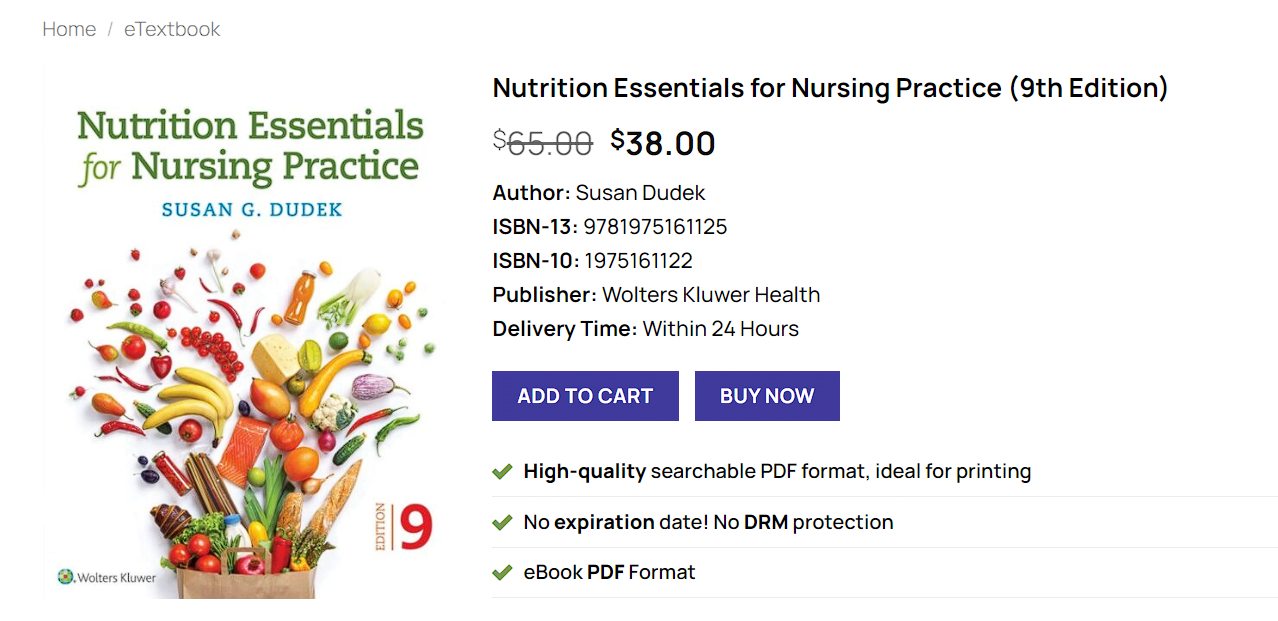“Nutrition Essentials for Nursing Practice, 9th Edition” serves as a pivotal resource for nursing professionals committed to integrating nutrition into their practice. Authored by Susan G. Dudek, this edition builds upon the solid foundation laid by its predecessors, incorporating the latest research findings and dietary guidelines to offer a more comprehensive understanding of nutritional science in the context of nursing care.
The book is meticulously structured to facilitate both learning and application. Its initial chapters delve into the fundamentals of nutrition, laying a crucial groundwork by exploring macronutrients and micronutrients, their roles in bodily functions, and the significance of balanced diets. This foundational knowledge is essential for nurses who must assess and address the nutritional needs of their patients accurately.
As the text progresses, it covers an array of topics critical to the nursing profession. Key chapters discuss the physiological impact of nutrients, detailing how they influence growth, development, and overall health. Furthermore, the book examines the interplay between nutrition and chronic diseases, providing valuable insights into how dietary choices can prevent or mitigate conditions such as diabetes, cardiovascular diseases, and obesity.
One of the distinguishing features of this edition is its adherence to the latest dietary guidelines and recommendations. Special attention is given to dietary needs across different populations, including children, adults, pregnant women, and the elderly. This population-specific approach ensures that nurses can tailor their nutritional advice to meet the unique needs of each patient, thereby improving health outcomes.
The “Nutrition Essentials for Nursing Practice, 9th Edition” not only serves as an academic textbook but also as a practical guide, replete with real-world applications and case studies. These elements underscore the book’s relevance in clinical settings, providing nurses with the tools they need to incorporate nutrition effectively into patient care. By staying current with evolving nutritional science, this edition remains an indispensable resource for nursing professionals dedicated to enhancing their practice through informed nutritional guidance.
Key Concepts and Principles Presented in the Book
The “Nutrition Essentials for Nursing Practice, 9th Edition” serves as a foundational guide for understanding the critical role of nutrition in nursing care. One of the primary concepts elucidated in the book is the significance of balanced nutrition. Balanced nutrition is essential for maintaining optimal health and preventing a multitude of diseases. It emphasizes the consumption of a variety of foods that provide necessary nutrients in appropriate amounts, ensuring that the body functions effectively.
Another vital principle covered is the impact of nutrition on health and disease. Poor nutrition can lead to adverse health outcomes, including chronic diseases such as diabetes, cardiovascular diseases, and obesity. Conversely, proper nutrition can play a preventive and therapeutic role. The book highlights the importance of nurses being well-versed in the latest dietary guidelines to effectively promote health and manage disease among their patients.
The role of nurses in promoting nutritional health is extensively discussed. Nurses are often at the frontline of patient care and have a unique opportunity to advocate for better nutrition. This involves conducting thorough nutritional assessments, which are critical for identifying nutritional deficiencies and imbalances. The book provides comprehensive guidelines on how to perform these assessments accurately to ensure that patients receive appropriate dietary interventions.
Dietary planning and intervention are also key principles emphasized in the text. Nurses must be equipped to create individualized nutrition plans that cater to the specific needs of their patients. Effective nutritional intervention can significantly improve patient outcomes, particularly for those with chronic conditions. For example, tailored dietary plans can help manage diabetes and reduce the risk of cardiovascular diseases.
The book also delves into the specific nutritional needs across different life stages – from infancy to old age. Each stage of life has unique nutritional requirements, and understanding these is crucial for providing age-appropriate care. Additionally, the text addresses the dietary considerations for various health conditions, offering valuable insights into the management of nutrition-related diseases.
In summary, “Nutrition Essentials for Nursing Practice, 9th Edition” equips nursing professionals with the essential knowledge and skills needed to effectively incorporate nutritional care into their practice. By understanding and applying these key concepts and principles, nurses can play a pivotal role in health promotion and disease prevention.

